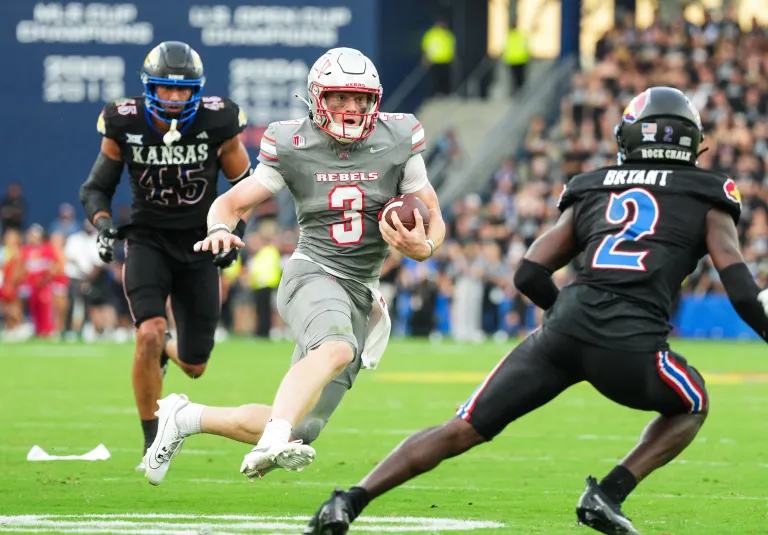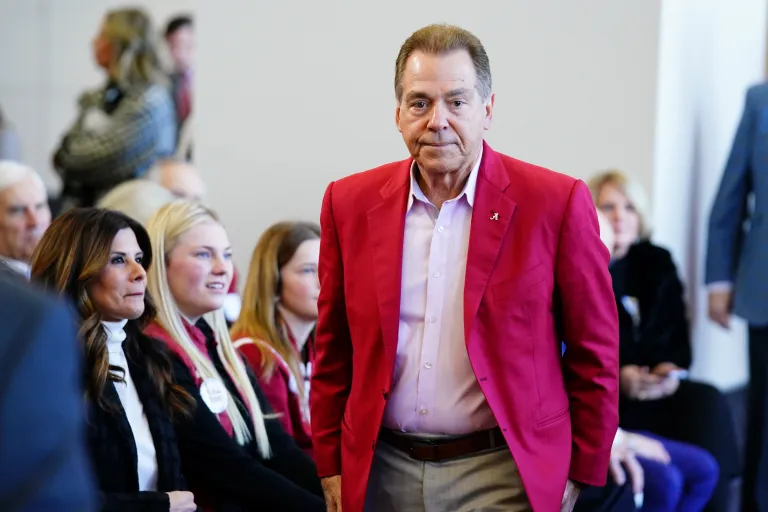
Former Alabama head coach and current ESPN “College GameDay” analyst Nick Saban offered a harsh assessment about what Name, Image, and Likeness (NIL) has done to college football. His comments come after quarterback Matthew Sluka rocked the college football world, leaving the 3-0 UNLV Rebels after claiming he was promised he would receive $100,000.
Marcus Cromartie of Equity Sports, Sluka’s NIL representation, told ESPN.com that the young quarterback only received $3,000. Because of that, Sluka decided to redshirt the rest of the season and will enter the transfer portal in December.

Related: Matthew Sluka, starting QB on CFB playoff contender, quits team over NIL money
Bob Sluka, the quarterback’s father, alleged to ESPN that UNLV offensive coordinator Brennan Marion offered Matthew Sluka $100,000 to play for the Rebels. Sluka ended up transferring from Holy Cross to UNLV.
NIL has upended college sports — for better and for worse. College players are finally getting the money they deserve, but there’s no regulated system to save athletes from potentially getting involved with shady agents or corporations.
During Saturday’s ESPN “College GameDay,” Saban took NIL to task.
“We don’t have a manageable system in college football. I’m not opposed at all to players making money. In fact, I think they deserve that. But the way we’re giving them money now, Name, Image, and Likeness is really not Name, Image, and Likeness, that’s supposed to be for a marketing opportunity, which I think is a good thing, but we’ve turned it into pay-for-play because we have donor-raised funds to be able to pay people,” Saban explained. “So, that system does not create value, long term, for players. I mean, you’re supposed to go to college to create value for your future, now we have guys making decisions about how much money they’re going to make, which I’m not sure that’s what we want the college experience to be.”
Nick Saban shares his thoughts on the impact of NIL in college football. pic.twitter.com/b5nOieXsF2
— College GameDay (@CollegeGameDay) September 28, 2024
Saban believes there needs to be a revenue-sharing program within college football. If not, the former Alabama coach believes there will be more situations like Sluka’s which will permeate college athletics.
“I think that this is a situation where you’re going to see more consequences like this in the future — guys get in the portal, they don’t get an opportunity, they lose their scholarship, and then guys don’t get what they’re promised,” noted Saban. “And the players don’t really have any protection from agents that they should have in terms of their representation. They should be represented in a very positive way and there’s no system for that in college athletics right now.”
Related: LSU football, trippin’ out and TikTok walk into a bar … stop me if you’ve heard this one before
Nick Saban wants federal legislation to regulate NIL

Since there’s no type of collective bargaining agreement in college athletics, and there are several conference commissioners, there’s no set national program. Saban called for federal legislation since states have their own laws about how to manage college programs.
“We have to have some kind of protection from litigation. I don’t really think players should be employees, although I think they should receive revenue for their efforts in playing,” Saban added. “But I also think that we have to have a system that emphasizes education.
“When these guys transfer, they have about a 20 percent less chance of graduating, and we got guys transferring three or four times. So, we’re going to have some really upsetting consequences of this down the road when we lose the fact that we’re not graduating players and they’re not creating value for their future.”
Earlier this year, Saban testified before a U.S. Senate committee about NIL in college football.
“We have collectives that in some places are raising huge amounts of money and going to compete against places that do not have the same resources to raise those kinds of funds to pay players,” Saban told the panel in March, via Sports Illustrated.
“You have a pay-for-play system and a free agency system that has no guidelines, so there’s no competitive balance. I think there’s going to be a lot of places that will say that and we’ll create a caste system where the rich will get richer and the poor will get poorer and eventually fans will look at it and say, ‘I don’t really want to watch this game.'”
ESPN’s Max Olson reports that if the House v. NCAA antitrust settlement is approved, it “will bring on a new era of revenue-sharing in college athletics beginning in 2025-26. Schools will be able to directly pay their athletes via NIL deals up to a limit, expected to be between $20 and $23 million per school next year with annual increases.”
That settlement is currently on hold.
Related: Heisman Watch 2024: Jaxson Dart rises in Week 5 Heisman Trophy rankings, latest Heisman odds